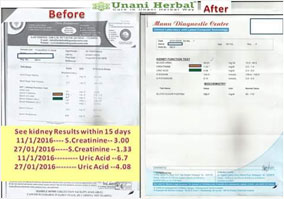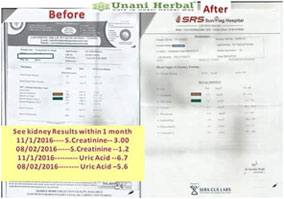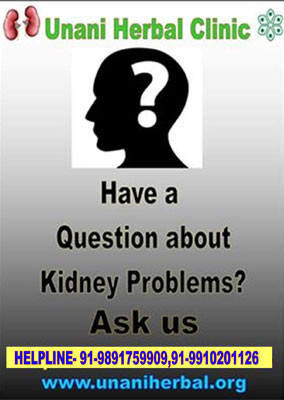Issue :- 7
KIDNEY AND UNANI HERBAL TREATMENT :

The kidneys are a pair of organs located in the back of the abdomen. Each kidney is about 4 or 5 inches long -- about the size of a fist.
kidneys are bean-shaped organs, each about the size of your fist. They are located near the middle of your back, just below the rib cage. The kidneys are sophisticated trash collectors. Every day, your kidneys process about 200 quarts of blood to sift out about 2 quarts of waste products and extra water. The waste and extra water become urine, which flows to your bladder through tubes called ureters. Your bladder stores urine until you go to the bathroom.
Functions:
The kidneys filter extra water and toxins from the blood. The kidneys filter about 120 to 152 quarts (113 to 144 liters) of blood to create 1 to 2 quarts (0.94 to 1.8 l) of urine every day.
They aren’t just one big filtering sponge, though. Each kidney is a system of millions of tiny filters called nephrons. A nephron has two parts. The glomerulus is the first part of the filter. It strains blood cells and large molecules from the toxins and fluid. The fluids and toxins that pass through then go through the tubule. The tubule collects minerals that the body needs and puts them back into the bloodstream and filters out more toxins.
In the nephron (left), tiny blood vessels intertwine with urine-collecting tubes. Each kidney contains about 1 million nephrons.
In addition to removing wastes, your kidneys release three important hormones:
- Erythropoietin (eh-RITH-ro-POYeh-tin), or EPO, which stimulates the bones to make red blood cells.
- Renin (REE-nin), which regulates blood pressure.
- The active form of vitamin D, which helps maintain calcium for bones and for normal chemical balance in the body.
Why Do Kidneys Fail?
Most kidney diseases attack the nephrons, causing them to lose their filtering capacity. Damage to the nephrons may happen quickly, often as the result of injury or poisoning. But most kidney diseases destroy the nephrons slowly and silently. It may take years or even decades for the damage to become apparent.
The two most common causes of kidney disease are diabetes and high blood pressure. If your family has a history of any kind of kidney problems, you may be at risk for kidney disease.
Diabetic Nephropathy
Diabetes is a disease that keeps the body from using sugar as it should. If sugar stays in your blood instead of breaking down, it can act like a poison. Damage to the nephrons from unused sugar in the blood is called diabetic nephropathy. If you keep your blood sugar levels down, you can delay or prevent diabetic nephropathy.
High Blood Pressure
High blood pressure can damage the small blood vessels in your kidneys. The damaged vessels cannot filter poisons from your blood as they are supposed to.
How Do Kidneys Fail?
Many factors that influence the speed of kidney failure are not completely understood. Researchers are still studying how protein in the diet and cholesterol levels in the blood affect kidney function.
Acute Renal Failure
Some kidney problems happen quickly, like an accident that injures the kidneys. Losing a lot of blood can cause sudden kidney failure. Some drugs or poisons can make your kidneys stop working. These sudden drops in kidney function are called acute renal failure (ARF).
ARF may lead to permanent loss of kidney function. But if your kidneys are not seriously damaged, acute renal failure may be reversed.
Chronic Renal Failure
Most kidney problems, however, happen slowly. You may have "silent" kidney disease for years. Gradual loss of kidney function is called chronic renal failure or chronic renal disease.
What Are the Signs of Kidney Disease?
People in the early stages of kidney disease may not feel sick at all. The first signs that you are sick may be general: frequent headaches or feeling tired or itchy all over your body.
If your kidney disease gets worse, you may need to urinate more often or less often. You may lose your appetite or experience nausea and vomiting. Your hands or feet may swell or feel numb. You may get drowsy or have trouble concentrating. Your skin may darken. You may have muscle cramps.

Treatment for Kidneys Failure
In light of the information above, the following are general pointers related to our fasting. This list is not exhaustive, and I would encourage seeking advice from your GP to make an individualised plan for your fasting.
Only Unanipathy and Ayurveda provides complete treatment for Kidneys Failure
Life indeed is a continuous chemical process in our body. Each chemical process results into releasing chemical fluids hazardous for bodily health. Kidneys excrete such unnecessary and toxic chemicals from the body, besides; they maintain water balance in body and secrete a variety of hormones; one of them for producing blood and another one to strengthen bones and absorb calcium.
Functions of Kidneys
Kidneys play a crucial role in the well-being of human life. Heart, lungs, liver and kidneys are four internal organs which cost life, in case any of them fails completely. Brain is quite significant in itself, but a long life is possible even after its complete breakdown, although such life will be more like botanical life. Kidneys in human body are located at both sides of spine just under the rib cage. Their size is equal to a fist. Two blood vessels which branch off from the abdominal aorta, the major artery, supply blood to kidneys. Inside the kidneys these two vessels develop branches into branches until they become hair-like and further division makes them invisible without telescope. At this stage these hair-like veins form a bunch covered in a bowl-like capsule. When blood, the mixture of solid atoms and water-like liquid, passes through theses hair-like veins with a pressure, the liquid gets strained off the solid atoms and gathers in the bowls containing veins. Having undergone various stages, strained liquid in thousands of such bowls, transforms into urine. Urine receptor tiny tubes connect into each other and gradually form a ureter from kidneys to bladder.
Consequences of kidneys damage
When kidneys stop functioning properly, toxic chemicals in our body increase. The patient may be fainted to death due to heightened level of toxicity in blood, if these chemicals are not excreted in time. Though there are a variety of chemicals, for common understanding it is suffice to know that doctors check the chemical increase through the level of urea in blood. Urea is derivative of urine. The health disorder caused by kidneys failure is called urea-poisoning. Kidneys maintain the level of various chemicals in our body which in normal condition are a part of the blood, but after they fail these chemicals increase to such an extent which threatens life. One of these chemicals is potassium. If potassium exceeds a certain level, it poses a threat to life. Therefore kidney patients are advised to strictly avoid potassium rich edibles like tomato or sweet lemon. Kidneys control the acid in our body; therefore kidney-damage increases acidity in blood. Kidneys keep body normal by excreting water from body in form of urine and when they stop working, water gathers in lungs, stomach and in heart cover causing swelling in body.
Causes of kidney damage
Diabetes which adversely affects each part of body is the major cause of kidney damage solely because it destroys the hair-like tubules which constitute the major part in the organ and kidney-function totally depends on them. That is why most of the diabetics suffer kidney damage approximately seventeen years after they have caught diabetes. It is imperative for diabetics to take precautionary measures as to avoid the adverse effects of diabetes on kidneys.
Another cause of kidney damage is high blood pressure. Blood pressure is always a health problem but at young age it is extremely dangerous. If not timely taken care of, it may lead to kidney-damage. In young adults and children kidney-damage is caused either by diseases which develop anti-bodies or by birth defects in kidneys. Some diseases are hereditary such as polycystic kidneys. Sometimes blockage in urine flow, Urinary Tract Obstruction and recurring infection in it, may also result in kidney failure.
Disease Symptoms
What is the most problematic in this regard is that no symptom appears. Until kidneys are severely damaged, patient lives in comfort, oblivious to insidious demon. Loss of appetite, having no taste in food, weakness and blood shortage signify serious kidney-damage. Headache and vomiting is a sign of severe damage. It is really unfortunate that kidney-damage is diagnosed in third world countries when it is severe. In developing countries people generally know the damage in early stage as they have regular general check-ups. Often patients ask if there both kidneys have got damaged. In fact, when both kidneys fail, only then the damage counts, otherwise, man can live with one kidney normally and full of life.
Sudden damage of kidneys
If kidneys once fail due to prolonged complexities, it is impossible to recover them with allopathic treatment. Sometime kidneys suddenly fail. If patient enjoys normal health conditions with healthy kidneys before he suffers sudden failure, it takes six weeks to restore kidneys to healthy condition. Meanwhile, if kidneys stop functioning, not only complex treatment, monitoring and intensive care is required, but time being dialysis also needed to maintain the chemical and water balance of body. Symptoms of kidney failure do not appear, unless 80%-90% kidneys are damaged. Prior to it patient feels no problem in urinating or in routine life.
With additional damage weakness increases and patient gets nausea. Possible symptoms of kidney failure are: swelling around eyes or in whole body, panting and high blood pressure. Some people face urine obstruction. Weakness increases with loss of appetite and weight loss. Sometime weight increases in case water level rises and body swells, but body weakens from within. Body goes yellowish due to blood shortage. Little movement leaves a man out of breath feeling extreme weakness. When kidney function is reduced to less than 10 percent, increased level of body fluids causes vomiting and drowsiness. In such case dialysis becomes necessary or else patient falls unconscious and succumbs to death.
Symptoms
If a blood pressure patient or diabetic or anybody notices any of the following symptoms, he must consult a kidney specialist:
- Loss of appetite
- Memory weakness
- Nausea or Vomiting
- Irritability
- Fatigue, weakness, decreased level of blood and yellow face
- Dry skin or itching
- Discomfort
- Urine frequency at night or Urinary obstruction
- Insomnia
- Swelling on face, eyes, arms, legs or ankles
- Sugar or Protein emission with urine
Diagnosis
Kidneys failure can be easily diagnosed. The only thing required is complete urine test and two blood tests including Blood urea and Serum Creatinine, besides, ultrasound can confirm the shape and size of kidney. Completely failed kidneys shrink. Renal Scan is also an option to detect the problem.
Treatment
Kidneys failure treatment is given as per the damage caused. If 50% Glomerular filtration rate (GFR) remains, the patient is given preventive treatment which controlling the kidney infection and causes of damage prevents additional damage. Through medication we can control the pace of disease, but cannot recover kidneys. If somebody claims that he would recover kidneys in full and patient would not need dialysis, he fools common folk and wastes patient's time.
If Glomerular filtration rate (GFR) goes below 10%, dialysis becomes a must. Dialysis may be of two types:
Peritoneal Dialysis, blood filtration through a tube inserted in abdomen. This is possible both in hospital and home. This way Peritoneal Fluid is removed through the tube inserted in the abdomen. The fluid removed takes along the harmful substances. This is a little slow process and does not require machine.
Haemodialysis, blood filtration through machine removes excess fluids and unnecessary water from the body through machine using an artificial kidney made of plastic. Such type of dialysis takes four hours and patient has to undergo it thrice a week as recommended, but twice a week also does. Patients have a little operation named AV fistula on arm in Hemodialysis. In case of emergency a special tube is inserted beneath shoulder or in the vein at the meeting point of legs and abdomen for time-being dialysis.
Renal Transplantation
If kidneys fail completely, the best treatment is kidney transplantation, which lets patient lead normal and healthy life thereafter. Both kidney donor and receiver should be of same blood group, besides, transplantation would be as much successful as much similar would be white blood cells and tissues of both donor and receiver. If there is any blood relation between donor and receiver, like son father, mother daughter or siblings, transplantation is most likely to succeed. In case of unavailability of kidney from relatives others kidney may also be transplanted. In most of the countries round the world kidneys of deceased people are being successfully transplanted. If the donor is a relative the ratio of success is 90%. In case the donor is other than relative the success ratio is reduced to 85% and it is 80% for five years, if kidney is taken from a deceased person.
Care and Precautions
Whatever we eat, is it food or medicine, its end products pass through kidneys. Frequent medicine use may affect the function of liver and kidneys especially Kushtas and prescriptions of uncertified self-claimed Hakeem's should be strictly avoided. Kushtas include heavy metals which destroy the membrane of liver and kidneys deform the organs and damage them completely in slow process. High blood pressure patients and diabetics should control blood pressure and diabetes as to reduce their adverse effect on kidneys to least possible extent.
Diabetics should especially take care of Urinary Tract Infection UTI and immediately consult physician and get urine tested, if there is any acidity in urine. Water intake should be increased so that waste materials get removed with urine. Staying at home one should take at least 2-2.5 liter water. Water intake must be increased in summer season or working outdoors in sunlight. If somebody finds his eye circle swollen, he should immediately consult the doctor. Swelling on leg is also a sign of kidney failure.
Preventive measures against kidney failure
Unanipathy offers effective medicines with quick results for kidney failure. Luminaries of Unanipathy in ancient time told that Samgh-e Arabi with the combination of some other supportive herbs was useful for kidney treatment. Modern Unanipathy has reinforced the idea that Unani treatment not only restores patient to health but after a few months of treatment patient does not need dialysis. The treatment is easy and with patience and consistency for a long time, prevents additional damage, provided a few things said below taken into consideration:
- Blood pressure should be controlled.
- Proper weight should be maintained.
- Level of Fat; such as Cholesterol and Triglycerides should be kept in control.
- Tobacco consumption should be given up at all.
- We have effective and curable treatment .We provide researched products without any side effects.
- See the difference within 15 Days by Our Unani Herbal Treatment:



 For Consultation click here
For Consultation click here
Copyright 2014 Unani Herbal
If you wish to cancel your subscription to this newsletter click here





